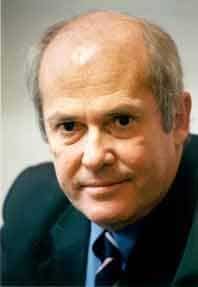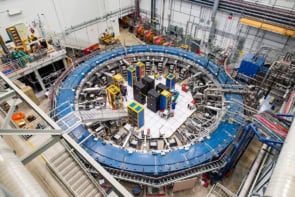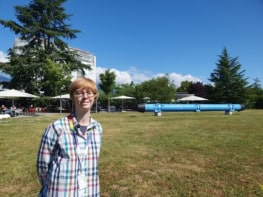
A review into the health of UK physics states that “significant damage” has been done to the UK’s international reputation in physics research as a result of an £80m shortfall in the budget of the Science and Technologies Facilities Council (STFC). The review, chaired by Bill Wakeham, vice-chancellor of Southampton University, also criticizes how the STFC communicates with the physics community. However, the review says that physics is nevertheless in a “good state of health”.
The Wakeham review was commissioned last December after an outcry by physicists at the £80m deficit in the STFC’s budget. The shortfall caused the UK to pull out of the International Linear Collider — the next big particle physics experiment after the Large Hadron Collider near Geneva — as well as reducing its observing time at the Gemini telescopes in Hawaii and Chile.
Although the nine-member review was not charged with making specific funding recommendations, it does express concern “at the structure of the STFC council, in terms of the impact it may have on the council’s ability to engage with the broad community it serves”. The review also calls for the council to be strengthened through appointing additional scientists.
It is disappointing that there is no recommendation for a financial uplift to alleviate planned cuts to research grants Paul Crowther, Sheffield University
Paul Crowther, an astrophysicist from Sheffield University, says that extra council members would be a welcome step that will better increase communication. “But it is disappointing that there is no recommendation for a financial uplift to alleviate planned cuts to research grants,” says Crowther.
Although the panel says that UK university departments are performing research at the highest quality, it notes that “educationally, the discipline faces enormous challenges”. It points out that physics in the UK has seen a year-on-year decrease for the last 20 years in the number of students taking the subject as well as a decline in the number of university physics departments.
Careers advice is lacking
”Many students aren’t aware of the diversity of opportunities physics presents,” says Mark Lancaster, a particle physicist from University College London, who has been campaigning against the STFC cuts, “but getting appropriate careers advice into schools is vital.”
The panel also calls for funding for solar-terrestrial physics to be transferred from the STFC to the Natural Environmental Research Council (NERC). “This will potentially give a boost to our subject area which has suffered in recent years due to the decline in funding support from the STFC” says Farideh Honary at Lancaster University who leads the UK’s Sub-Auroral Magnetometer Network (SAMNET).
The Royal Astronomical Society welcomes the acknowledgement of solar-terrestrial physics as an important cross-disciplinary area and “cautiously agree[s]” that responsibility for some of this area should move from STFC to NERC.
[The review] has identified the challenges physics faces and the issues that need to be addressed Mark Lancaster, University College London
Overall, however, there is little that is contentious in the review. “It has identified the challenges physics faces and the issues that need to be addressed — the surprise is there isn’t a surprise,” says Lancaster.
Jocelyn Bell Burnell, the Institute of Physics’ new president said “if the recommendations for greater consultation with the science community are all acted upon, they should go a long way to ensure that we do not encounter similar difficulties in the future.”



